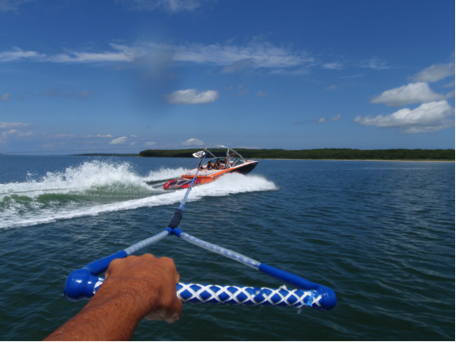July 2015 Newsletter

July 2015 Newsletter
With the temperatures consistently rising every day, it is no surprise that you and your family are looking for a fun way to cool off. One of the most common ways to have fun and stay cool is boating. Having a boat in the water allows for all different ways to have fun including tubing, waterskiing, wakeboarding, and diving. Unfortunately, if you are not careful you could easily injure yourself doing one of these activities and potentially ruin the rest of your summer. Check out some of these tips to stay safe while you’re out on the water.
When it comes to diving, it does not matter if you are just diving off of the side of a boat or if you are doing flips off of the springboard, one of the most common injuries that occurs from diving is “Diver’s Ear”. Diver’s ear is caused by an infection in the middle ear due to mucus buildup. Diver’s ear may result in temporary hearing loss, hearing unusual sounds, or pain and discomfort during flying or diving.
If your ear pops, a quick solution to this issue is to hold your nose and blow out of your mouth hard. This will cause the pressure inside the ear to equalize with the outside. If this does not work, you can also try chewing gum (not while you are swimming). Nasal decongestants, such as Claritin, Afrin and Neo-Synephrine, can also help to clear the ears. However, you should avoid flying and diving until this condition subsides.
Neck injuries are also common while diving if the proper technique is not used. Children should be taught proper diving technique and should always be supervised when diving. The most common result of neck injuries caused by diving accidents is paraplegia and quadriplegia (the paralysis of limbs).
Waterskiing and wakeboarding are two of the most common boating activities. However, it is very easy to suffer an injury during these activities if one is not careful.
The most common injury suffered by beginners while skiing is back pain caused by leaning forward. To prevent this, work on strengthening your back muscles before skiing. You should also work on your bicep muscles. If you keep your arms locked while holding onto the rope for too long, you can develop tennis elbow. To avoid this, bend your arms and let your biceps do the work.
Some general safety tips for skiing and wakeboarding, are:
- Always wear a life jacket (regardless of your swimming ability). If you become unconscious after a fall, you will not be able to keep yourself afloat even if you are an Olympic swimmer.
- Always have at least 2 people in the boat. One driver and one spotter. It is the spotter’s job to watch skier/wakeboarder and alert the driver is a fall occurs.
- Never drink when boating, it lowers your ability to swim and your coordination in general.
- Choose a proper body of water. If you plan on skiing or wakeboarding, be sure that the water is not shallow and that it is long enough and wide enough for the activity to take place. You should also avoid heavily crowded areas to avoid injury to yourself or others.
- Check the weather before you go out. If it is windy, the water may become choppy at a moment’s notice. If it is raining, it may lower visibility for the spotter. If there is a thunderstorm, you would not want to be out on the water in case of lightning strikes.
Tubing is a popular water activity among people of all ages. However, it is also possible to become injured while tubing just like any other watersport.
The warning label on a tube gives specific instructions pertaining to weight, occupancy number and maximum speed. These instructions should be followed to avoid injuries of the tubers.
The towrope used for tubing, should be inspected and in good condition each time it is attached to a tube. The engine should also be turned off if the rope becomes tangled around the propeller to avoid the ripping of the rope.
Always try to maneuver the tube in the opposite direction of which the boat is turning. If the boat is turning right, lean left. If the boat is turning left, lean right. This will better prevent the tube from flipping over and potentially injuring the tubers.
Similarly to waterskiing and wakeboarding, a “spotter” should also be designated when people are tubing. The spotter allows the driver to know if the tubers fall off, if they want to change speed or if they want to stop.
Check out this delicious, but healthy recipe for “Sweet and Spicy Grilled Salmon” that is perfect for summer!

http://www.foodnetwork.com/recipes/food-network-kitchens/sweet-and-spicy-grilled-salmon-recipe.html


